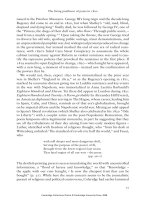The cambridge companion to british roman 35
Bạn đang xem bản rút gọn của tài liệu. Xem và tải ngay bản đầy đủ của tài liệu tại đây (38.58 KB, 1 trang )
The living pantheon of poets in 1820
issued in the Peterloo Massacre. George III’s long reign and the decade-long
Regency did come to an end in 1820, but when Shelley’s “old, mad, blind,
despised and dying king” finally died, he was followed by George IV, one of
the “Princes, the dregs of their dull race, who flow / Through public scorn, –
mud from a muddy spring.”3 Upon taking the throne, the new George tried
to divorce his old wife, sparking public outrage, street demonstrations, and
an unprecedented pamphlet war; but widespread protest produced no change
in the government, but instead marked the end of one era of radical resistance, with 1820’s failed Cato Street Conspiracy to assassinate the whole
cabinet turning many against Reform as violent resistance was used to justify the repressive policies that provoked the resistance in the first place. If
1819 seemed to open England to change, 1820 – which might have appeared,
with a new king, a moment of transition – instead saw the confirmation of
the powers that be.
We would not, then, expect 1820 to be immortalized as the prior year
was in Shelley’s “England in 1819,” or as the Regency’s opening in 1811,
marked by economic distress giving rise to Luddite resistance and key events
in the war with Napoleon, was immortalized in Anna Laetitia Barbauld’s
Eighteen Hundred and Eleven. Yet there did appear in London during 1821
Eighteen Hundred and Twenty: A Poem, probably by Alexander Hill Everett,
an American diplomat then serving in The Hague, whose career, leading him
to Spain, Cuba, and China, reminds us of that era’s globalization, brought
on by imperial efforts and the Napoleonic world war. Mixing an odal appeal
to Spain’s liberal revolution (which Shelley also celebrated in his 1820 “Ode
to Liberty”) with a couplet satire on the post-Napoleonic Restoration, the
poem lampoons ultra-legitimatist monarchs, in part by suggesting that they
see all the tribulations of their day arising from two early modern figures –
Luther, identified with freedom of religious thought, who “from his desk at
Wittenberg unfurled / The standard of revolt o’er half the world,” and Faust,
who
with still deeper and more dangerous skill,
Serving the purpose of the power of ill,
Brought from the lower region’s last recess
That fatal engine of all our woe – the press.
(pp. 26–7)
The devilish printing press is seen as inundating the world with uncontrolled
information, a “flood of heresy and knowledge,” so that “Knowledge –
the apple with our ruin fraught, / Is now the cheapest fruit that can be
bought” (p. 27). While here the main concern seems to be the journalistic
pursuit of religious and political controversy, Coleridge had earlier lamented
13
Cambridge Collections Online © Cambridge University Press, 2008









